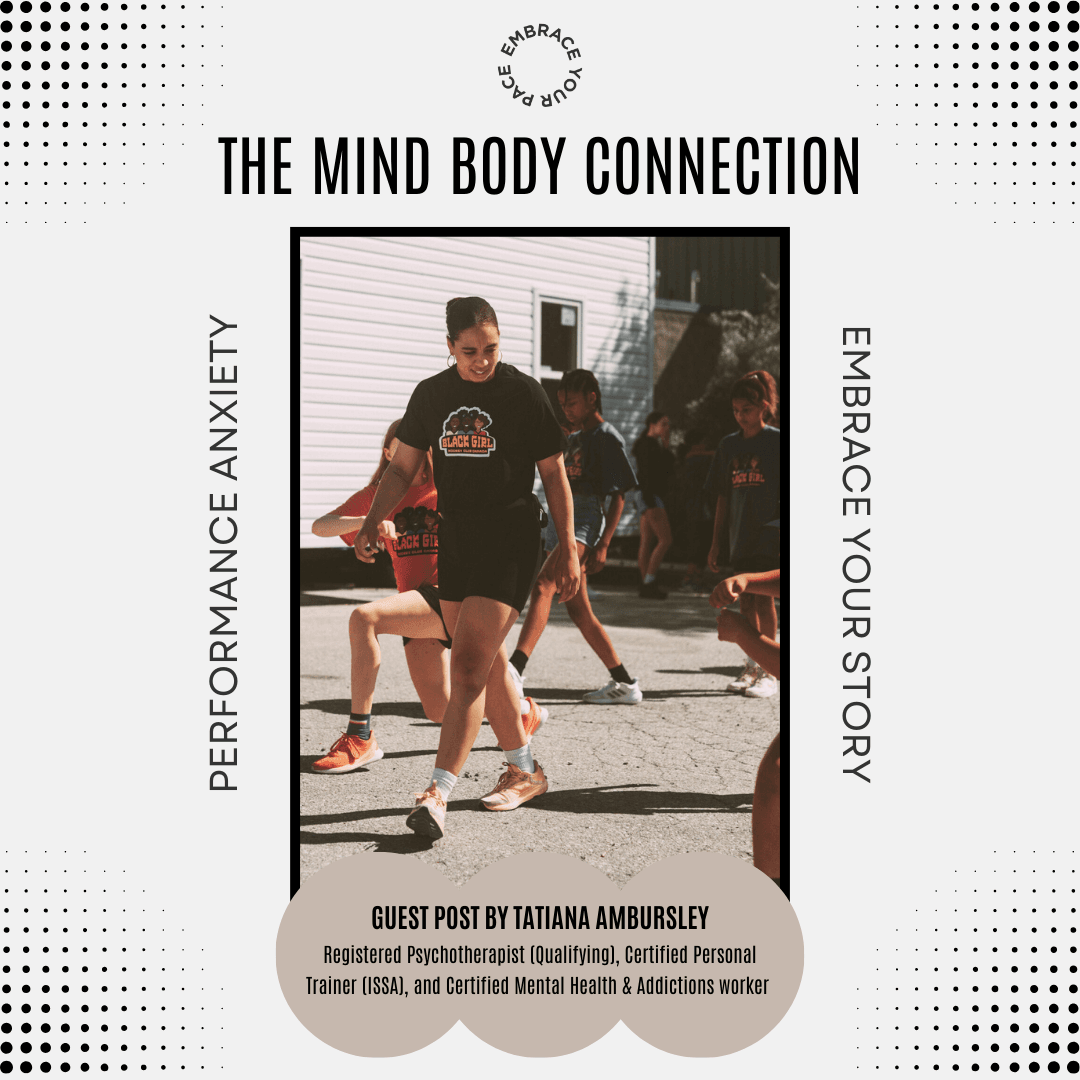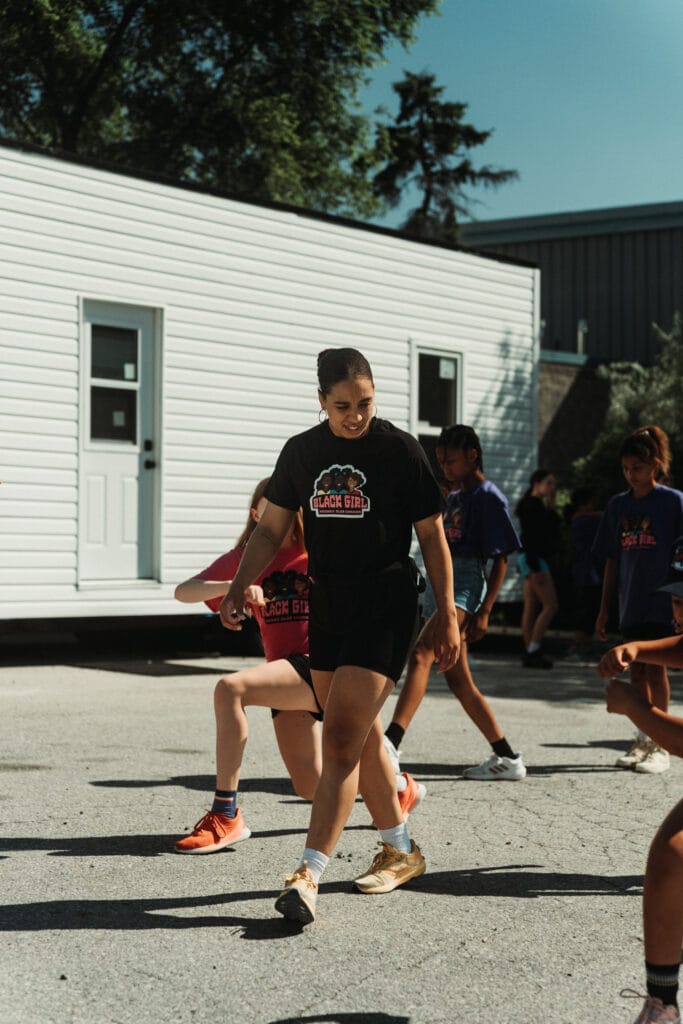
The Mind Body Connection


Author: Tatiana Ambursley, Registered Psychotherapist (Qualifying), Certified Personal Trainer (ISSA), and Certified Mental Health & Addictions worker
One of my earliest memories as a little athlete was my fear of playing a sport. I ended up spending about 20 years of my life playing. My mom dressed me in my first soccer uniform, excited to see her daughter in her first soccer game. Only a few years apart from my brothers, they had already been well-versed in soccer, and my mom was excited to see her little girl not only follow in their steps but hers. Little did I know at the age of four, I would have my first experience with the trendy word anxiety. I stood on that field, terrified to play; I latched onto my mom’s leg, I held the refs’ hand- who happened to be a family friend, and even stood by the net picking flowers as I watched all the other girls play. I can’t remember if my mom was disappointed, sad, or upset with me, but I do remember going back. Although I was terrified, my stomach ached, and I was nervous about participating; a big part of me also wanted to play. I wanted to be as cool as my big brothers.
Although this small experience is one I can look back on and laugh at, this was the beginning of my avalanche. That fear, nervousness, and uncertainty continuously grew with each game, practice, team, tournament, coach, you name it. I later went on to experience this crippling, nauseating, unsettling feeling with every sport, assignment, activity, or outing, and I never understood what was wrong with me or how to change it.
Today, I am a Master of Psychology Student, certified personal trainer, and overall wellness enthusiast. If you asked me as a child, teenager, and even young adult, “Will you always love competitive sports?” I would have said no. If you asked me if I would be teaching others how to overcome the disconnect between our minds and bodies, I would have said no. Fast forward to today, and one of my biggest passions is supporting others, not just athletes, with understanding how to develop confidence, awareness, and joy in their wellness journeys.

Performance Anxiety
If you had the luxury of not experiencing what I have described above or the unfortunate experience of going through a similar one, you’d know that I am talking about performance anxiety.
As a child, teenager, and even young adult, I had no awareness of this term. “Performance anxiety refers to the anxiety that people experience in anticipation of and/or during important tasks, resulting in impaired performance” (Angelidis et al., 2019, p.2). Not only does performance anxiety commonly affect athletes, but it can affect everyone, from public speakers to musicians .
Psychology tells us (Kremer et al., 2019)
- Anxiety helps or hinders performance based on how we interpret it
- Anxiety is not all or nothing; it affects us at different levels
- We all have our own zone or range of physiological arousal where one can perform at their peak physical, mental, and skillful ability (American Psychological Association, n.d.).
Mind-body Connection
Now, there are many symptoms one can experience, from physical, emotional, cognitive, and behavioral, and many ways one can approach treatment options. One area I have found to support my mental and physical well-being has been increasing the mind-body connection in all areas of my life. More specifically, when it comes to my fitness journey, I have come to understand that my thoughts have a direct impact on my actions, and my physical body can be directly connected to my thought patterns.
If you ever experience performance anxiety, some questions I encourage you to ask yourself is…
“What am I thinking before, during, and after?”
- Bringing awareness to what we are telling ourselves can also bring insight into how we are performing. Once we bring awareness to our thought patterns, we can then ask ourselves,
“What is the direct result of these thoughts?”
- For example, if I consistently notice before a game my thoughts are focused on what can go wrong or what I’ve done wrong in the past… it is likely that the first mistake you make in a warmup can confirm the thoughts you previously had.
Now that you are aware of your thoughts and the results that can come from them, the next step is to actively change that thought and action. For example, before a game, when you notice your thoughts are leading towards negative outcomes, take a moment to capture the thought and speak the truth over self. You can also spend time visualizing yourself doing what you know how to do with confidence. Additionally, taking a few breaths can regulate your nervous system, reducing tension, nausea, or even shaking in one body part.
Overall, there are multiple techniques and tips to better understand the mind-body connection and how to enhance your overall well-being. My biggest advice to wrap up this blog is to remember that you are one person in this big world; you have your own story and your own journey, and most importantly, only you can define your outcome.
Embrace your journey, embrace your story, and embrace your pace because no one else can get through your life better than you!

Guest Blog Post Written By:
Tatiana Ambursley, Registered Psychotherapist (Qualifying), Certified Personal Trainer (ISSA), and Certified Mental Health & Addictions worker
@tatiana.faith
References
American Psychological Association. (n.d.). Zone of optimal functioning (ZOF). In APA dictionary of psychology. Retrieved March 27, 2023, from https://dictionary.apa.org/zone-of-optimal-functioning.
Angelidis, A., Solis, E., Lautenbach, F., van der Does, W., & Putman, P. (2019). I’m going to fail! Acute cognitive performance anxiety increases threat interference and impairs WM performance. PloS One, 14(2).
Kremer, J., Moran, A. P., & Kearney, C. J. (2019). Pure sport: Practical sport psychology. Routledge.
Share this:
- Click to share on X (Opens in new window) X
- Click to share on Facebook (Opens in new window) Facebook
- Click to print (Opens in new window) Print
- Click to email a link to a friend (Opens in new window) Email
- Click to share on LinkedIn (Opens in new window) LinkedIn
- Click to share on Reddit (Opens in new window) Reddit
- Click to share on Pinterest (Opens in new window) Pinterest
- Click to share on WhatsApp (Opens in new window) WhatsApp
Testimonials
Client Reviews
“Thank you so much for being an example of leadership and healthy training habits for our athletes.”
Irene, Athletic Trainer
“Karelle’s workshop was very helpful and was definitely worth the time.”
Soccer Player
“Good quality items that spread a powerful message.”
Mia
“I hope you know that you make a large impact in the lives of many”.
Sydney. Pro Softball Player
Embrace Your Pace
Copyright © 2024 Embrace Your Pace- All Rights Reserved
Website Design by E.K. Business Solutions LLC


